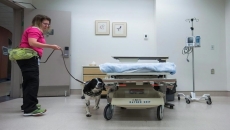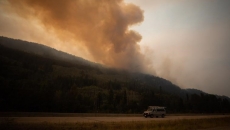OTTAWA - When most parents decided to have kids, they probably thought some of their bigger parenting decisions would be about sleep-training, extracurricular activities or the right age to get a phone.
Few probably thought ahead to the best way to protect their kids from a global pandemic that shows no signs of slowing down after nearly a year and a half.
Soon parents might get to decide whether to vaccinate their young children against COVID-19, and according to Canada's top doctor they'll have to consider more than just the safety data.
"It is a complex set of factors," Dr. Teresa Tam, the said chief public health officer, said in a news briefing Friday.
There are no COVID-19 vaccines approved for use in children under 12 in Canada right now, but Pfizer announced earlier this week positive results in its trial for kids aged five and up.
2/2 With >6.6M eligible Canadians not yet fully vaccinated & 4.8M too young to get #COVID19vaccines, there are still too many susceptible people and too many opportunities for the virus to spread. We need to close the protection gap now! ➡️https://t.co/fWWqijQD8w pic.twitter.com/j76rR3aEzb
— Dr. Theresa Tam (@CPHO_Canada) September 24, 2021
The company said the Pfizer-BioNTech vaccine was safe, well tolerated and showed robust neutralizing antibody responses in kids aged five to 11, with results for children six months to five years old expected as early as later this year.
Once the company submits its findings to the government, Health Canada and the National Advisory Committee on Immunization will look carefully to determine if the vaccine is safe and effective for children.
But with the virus posing a smaller risk of serious illness and death in children, Dr. Nazeem Muhajarine expects parents to have more trepidation about vaccinating their kids than they did getting the shot themselves.
The same is true of long-standing routine vaccines that babies have been getting for many years, said Muhajarine, a professor of community health and epidemiology at the University of Saskatchewan.
"If you extrapolate from that to COVID-19 vaccines, I think there will be an even greater concern among some parents about getting their kids inoculated against COVID-19," he said in an interview Friday.
He said parents should consider other factors when weighing the risks and benefits of the vaccine, including the unknown effects of "long COVID."
"Some kids have shown symptoms and signs and challenges, including cognitive challenges, months and months after that initial recovery," he said. "I think we don't know much about long COVID, and we have to keep that in mind."
Rare incidents of serious illness and even death in kids can also become more common as the virus spreads through the population, Tam warned parents.
"We will see children in the hospitals, as well as some rare but serious cases, and the numbers of those can be significant if there's a lot of viral activity," she said.
In Ontario, kids under 11 years old accounted for more than 20 per cent of new COVID-19 cases in the province over the last two days.
That's up from just 12.6 per cent in the last week of August.
Parents and policy-makers will also have to consider which option is most likely to keep kids in schools, Tam said.
In Britain, the Joint Committee on Vaccination and Immunisation (JCVI) could not recommend universally vaccinating healthy kids age 12 to 15 on health grounds alone, because the margin of benefit was small, and there was evidence of a link to extremely rare cases of myocarditis — an inflammation of the heart.
In Canada there have been 774 reported instances of myocarditis and pericarditis, inflammation of the membrane around the heart, as of Sept. 17, out of 54 million vaccines administered so far.
Tam said government agencies are watching the situation carefully because though instances of myocarditis after vaccination are rare, they appear more commonly in young adults.
"This has got to be weighed against significant social, educational, developmental and mental health impacts on children for missing schools," Tam said.
Ultimately the U.K.’s four chief medical officers opted to offer vaccines to that age group anyways, in part because of the importance of kids being able to stay in their classrooms.
The National Advisory Committee on Immunization and the Public Health Agency of Canada will provide more official advice when they receive and analyze the safety and efficacy data from Pfizer and other vaccine manufacturers.






